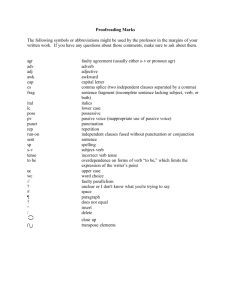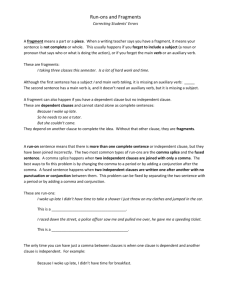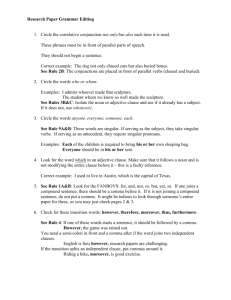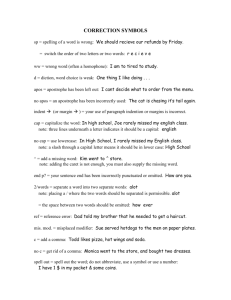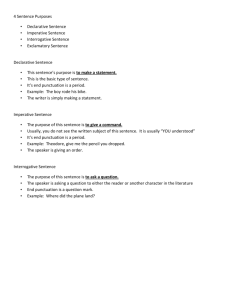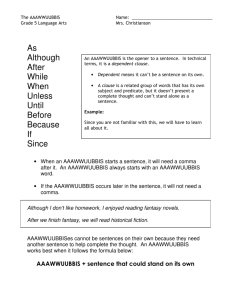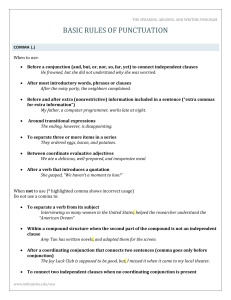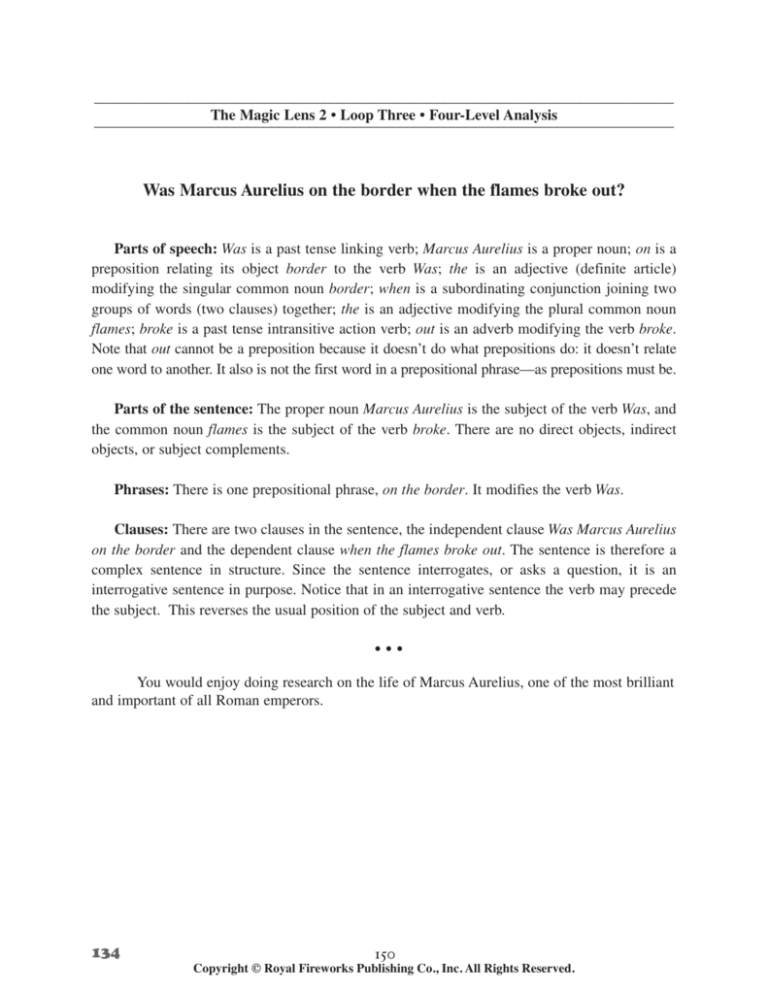
_____________________________________________________________________________
The Magic Lens 2 • Loop Three • Four-Level Analysis
_____________________________________________________________________________
Was Marcus Aurelius on the border when the flames broke out?
Parts of speech: Was is a past tense linking verb; Marcus Aurelius is a proper noun; on is a
preposition relating its object border to the verb Was; the is an adjective (definite article)
modifying the singular common noun border; when is a subordinating conjunction joining two
groups of words (two clauses) together; the is an adjective modifying the plural common noun
flames; broke is a past tense intransitive action verb; out is an adverb modifying the verb broke.
Note that out cannot be a preposition because it doesn’t do what prepositions do: it doesn’t relate
one word to another. It also is not the first word in a prepositional phrase—as prepositions must be.
Parts of the sentence: The proper noun Marcus Aurelius is the subject of the verb Was, and
the common noun flames is the subject of the verb broke. There are no direct objects, indirect
objects, or subject complements.
Phrases: There is one prepositional phrase, on the border. It modifies the verb Was.
Clauses: There are two clauses in the sentence, the independent clause Was Marcus Aurelius
on the border and the dependent clause when the flames broke out. The sentence is therefore a
complex sentence in structure. Since the sentence interrogates, or asks a question, it is an
interrogative sentence in purpose. Notice that in an interrogative sentence the verb may precede
the subject. This reverses the usual position of the subject and verb.
•••
You would enjoy doing research on the life of Marcus Aurelius, one of the most brilliant
and important of all Roman emperors.
134
150
Copyright © Royal Fireworks Publishing Co., Inc. All Rights Reserved.
FOUR-LEVEL ANALYSIS
Was Marcus Aurelius on the border when the flames broke out?
Parts
of Speech:
v. -----------n.----------- prep. adj.
n.
conj. adj.
n.
v. adv.
________________________________________________________________
Parts
of Sentence: pred. -------subject-------subj. pred.
________________________________________________________________
Phrases:
---prep. phrase--________________________________________________________________
Clauses:
an ID complex interrogative sentence
________________________________________________________________
was
Marcus Aurelius
border
broke
flames
151
Copyright © Royal Fireworks Publishing Co., Inc. All Rights Reserved.
135
_____________________________________________________________________________
The Magic Lens 2 • Loop Three • Grammar Ideas
_____________________________________________________________________________
Questions for individual thought or small group discussion:
synthesis: making combinations
What is a comma? Try to condense everything you know about commas into
a single definition.
divergence: thinking of alternatives
Someone once defined nouns as names of living things and nonliving things.
Remembering that the definitions of the elements of grammar you have learned are
only the best attempts of individuals to put these matters into words, think of
interesting alternative definitions to terms we have already defined. If possible,
think of several interesting alternative definitions to the same term.
analysis: breaking down into components
Explain the relationship between the names of the categories of pronouns and
the function that each category performs in a sentence.
136
152
Copyright © Royal Fireworks Publishing Co., Inc. All Rights Reserved.
_____________________________________________________________________________
The Magic Lens 2 • Loop Three • Mystery Sentence
_____________________________________________________________________________
Use the grammar clues to solve this Mystery Sentence:
This sentence from a children’s rhyme
begins with an adverb of direction,
followed by an intransitive past tense
action verb, then a definite article, then a
singular common noun which is the
subject; the subject is followed by a
coordinating conjunction, a transitive
active voice past tense action verb, a
definite article, a singular common noun
as direct object, and an adverb. So the
sentence begins and ends with adverbs,
and has a compound verb. Only the direct
object has two syllables, every other
word only has one.
____________________________________
Down came the rain and washed the spider out.
153
Copyright © Royal Fireworks Publishing Co., Inc. All Rights Reserved.
137
_____________________________________________________________________________
The Magic Lens 2 • Loop Three • Literary Grammar
_____________________________________________________________________________
From John Knowles’s
A Separate Peace
I didn’t entirely like this glossy new surface, because
it made the school look like a museum, and that’s
exactly what it was to me, and what I did not want
it to be. In the deep, tacit way in which feeling
becomes stronger than thought, I had always felt
that the Devon School came into existence the day
I entered it, was vibrantly real while I was a student
there, and then blinked out like a candle the day I
left.
What are the characteristics of this passage from John Knowles’s A Separate Peace? How
does the grammar support the narrative style? What role do pronouns play in the passage? What
would happen if you circled every word that was one syllable? What would that show you about
the passage? Why would the passage be that way? What is the relationship between the narrative
style and the level of the diction?
138
154
Copyright © Royal Fireworks Publishing Co., Inc. All Rights Reserved.
_____________________________________________________________________________
The Magic Lens 2 • Loop Three • Grammar Recipes
_____________________________________________________________________________
1. Write a one-clause sentence that
contains an infinitive phrase as subject
and a gerund phrase as direct object.
2. Write a complex sentence that
contains two dependent clauses and only
one independent clause.
________________________________
1. To think about cheeseburgers implies wanting some.
2. If you remember, I lost the book when the bear appeared.
155
Copyright © Royal Fireworks Publishing Co., Inc. All Rights Reserved.
139
_____________________________________________________________________________
The Magic Lens 2 • Loop Three • Writing Lab
_____________________________________________________________________________
Loop Three Writing Lab
The Nature of Conjunctions
1. Write a paragraph of 50-100 words, using only
simple sentences, and more than ten coordinating
conjunctions.
2. Rewrite the paragraph, but this time, you are
not allowed to put the same part of speech on both
sides of any conjunction.
3. Reflect on what this attempt has shown you.
4. Write a statement about the nature of
conjunctions, and what the complete structure of
conjunction and two conjuncted terms is like when it is
well made.
140
156
Copyright © Royal Fireworks Publishing Co., Inc. All Rights Reserved.
_____________________________________________________________________________
The Magic Lens 2 • Loop Three • Quotation Analysis
_____________________________________________________________________________
It is an honor that I dream not of.
-Juliet, in William Shakespeare’s Romeo and Juliet, I iii.
When Juliet’s mother, Lady Capulet, asks her daughter how she feels about getting married, Juliet makes this response.
_________________________________________________________
Parts of speech: It is a third person singular subject pronoun; is is a present tense singular action verb; an is an indefinite article and adjective; honor is a singular common noun; that is
a relative pronoun; I is a first person singular subject pronoun; dream is a singular present tense
action verb; not is an adverb modifying the verb; of is an adverb modifying the verb.
Parts of the sentence: It is the subject of the linking predicate is, which connects the subject to the subject complement honor; I is the subject of the intransitive action predicate dream.
Phrases: The sentence contains no prepositional, appositive, or verbal phrases, although
it has the interesting adverb of, which is usually used as a preposition.
Clauses: This is a complex declarative sentence; the independent clause is It is an honor,
which is followed by a dependent clause: that I dream not of.
FOUR-LEVEL ANALYSIS
It
is
an
honor
that
I
dream
not
of.
Parts
of Speech:
pron. v.
adj.
n.
pron. pron.
v.
adv. adv.
_________________________________________________________________
Parts
subject
of Sentence:
subj. pred.
complement
subj.
pred.
_________________________________________________________________
Phrases:
-------------no phrase-------------_________________________________________________________________
Clauses:
------independent clause----------------dependent clause-----------complex declarative sentence
_________________________________________________________________
157
Copyright © Royal Fireworks Publishing Co., Inc. All Rights Reserved.
141
_____________________________________________________________________________
The Magic Lens 2 • Loop Three • The Word Within the Word 2 • List #45
_____________________________________________________________________________
Identify the part of speech of the word in italics:
1.
aquiline: eaglelike
The emperor had an aquiline nose, like an eagle’s beak.
________________
2.
malfeasance: public misconduct
The public official was accused of malfeasance in office.
________________
3.
costermonger: fruit and vegetable vendor
London’s cockney costermongers sold fruit on the sidewalk.
________________
4.
gynecocracy: a government of women
The chauvinist was afraid of gynecocracy.
________________
5.
tenebrous: dark and gloomy
The castle’s tenebrous interior frightened Jonathan.
________________
6.
superego: unconscious conscience
Sigmund Freud thought the id was controlled by the superego.
________________
7.
expostulate: to earnestly object
Elizabeth Bennet ignored his earnest expostulations.
________________
8.
monograph: a paper on one subject
The scholar published a monograph on the subject.
________________
Identify the part of sentence of the word in italics:
9.
lacustrine: of lakes
Yeats loved the lacustrine environment of Innisfree.
________________
10. pungent: sharp (especially in smell)
The pungent smell of the spice penetrated the room.
________________
11. megalomania: delusions of greatness
The British thought Napoleon was a megalomaniac.
________________
12. syndrome: a complex of symptoms
The syndrome of pessimism weakened the economy.
________________
13. euphemism: a pleasant name
The term “rest room” is a euphemism.
________________
14. dissonant: inharmonious
A dissonant clamor arose in the street below Talleyrand’s room.
________________
15. narcolepsy: attacks of sleep
The man with narcolepsy kept falling asleep, even as he spoke.
________________
142
158
Copyright © Royal Fireworks Publishing Co., Inc. All Rights Reserved.
_____________________________________________________________________________
The Magic Lens 2 • Loop Three • The Word Within the Word 2 • List #46
_____________________________________________________________________________
For the next sentences, identify the type of phrase in italics, and give its part of speech.
1.
paragon: excellent model
Her computer graphic was a paragon of inventive geometry.
________________
2.
antipathy: strong dislike
His fierce antipathy for his rival continued unabated.
________________
3.
abyss: bottomless fissure
The wild Irish gorge seemed to be a profound abyss.
________________
4.
dissemble: conceal through pretense
Do not be fooled by this dissembling and pretense.
________________
5.
insidious: sly
Skillful plotting entrapped him; it was an insidious scheme.
________________
6.
impecunious: poor
The skinflint had money; he only appeared to be impecunious.
________________
7.
kinesiology: the science of motion
Fully convinced, the Olympic coach studied kinesiology.
________________
8.
beatify: make blissfully happy
After the award she felt completely, blissfully beatified.
________________
For the next sentences, identify the sentence structure (disregard bold type).
9.
execrate: to denounce or curse
Xerxes bootlessly execrated Alexander, but his words were empty.
________________
10. ne plus ultra: peak of perfection
As Ruskin thought, the Mona Lisa is the ne plus ultra of portraits. ________________
11. vociferous: loud
His vociferous expostulations disrupted her tranquility; I know.
________________
12. corpulent: full-bodied
As you can see, the corpulent epicure enjoys his own creations.
________________
13. perihelion: the orbital point nearest to the sun
When the comet reached perihelion, its tail crossed the sky.
________________
14. cryptic: hidden
The Celtic runes contained a cryptic message from the Druids.
________________
15. sanctimonious: affectedly holy
His sanctimonious condescension revealed his true feelings.
________________
159
Copyright © Royal Fireworks Publishing Co., Inc. All Rights Reserved.
143
_____________________________________________________________________________
The Magic Lens 2 • Loop Three • P as ƒ of G
_____________________________________________________________________________
For each of the following sentences, circle the letter of each answer that is true. The answer can
be any combination, including all or none. This exercise will teach you the real process of
punctuation as a function of grammar.
1. America the Beautiful is the best song to sing if youre in the mountains.
a. italics on the song title
b. quotation marks around the song title
c. a comma after the dependent clause
d. a comma after the independent clause
e. an apostrophe in the contraction
2. Yes its best to visit four cities in a six week tour.
a. a comma after the interjection
b. an apostrophe in the possessive pronoun
c. an apostrophe in the contraction
d. a comma after the independent clauses
e. a hyphen in the compound adjective
3. On the swampy peninsula the incidence of malaria was up by two thirds.
a. comma after the introductory prepositional phrase
b. a hyphen in the fraction
c. a comma after the dependent clause
d. commas around the appositive
e. commas around the parenthetical remark
4. On December 16 1775 Jane Austen the British novelist was born.
a. a comma after the day
b. a comma after the year appositive
c. a comma after the participial phrase
d. commas around the appositive
e. a comma after the dependent clause
5. Buoyed by his sudden fame Dali painted with new enthusiasm.
a. a comma after the dependent clause
b. comma after the introductory prepositional phrases
c. a comma after the participial phrase
144
162
d. commas around the appositive
e. a semicolon between the clauses
Copyright © Royal Fireworks Publishing Co., Inc. All Rights Reserved.

